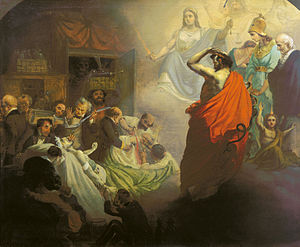
Back طب إخلافي Arabic Алапатыя Byelorussian Al·lopatia Catalan Allopatie Czech Allopati Danish Allopathie German Alopatio Esperanto Alopatía Spanish طب آلوپاتی Persian Allopathie French

Allopathic medicine, or allopathy, is an archaic and derogatory label originally used by 19th-century homeopaths to describe heroic medicine, the precursor of modern evidence-based medicine.[1][2] There are regional variations in usage of the term. In the United States, the term is sometimes used to contrast with osteopathic medicine, especially in the field of medical education. In India, the term is used to distinguish conventional modern medicine from Siddha medicine, Ayurveda, homeopathy, Unani and other alternative and traditional medicine traditions, especially when comparing treatments and drugs.
The terms were coined in 1810 by the creator of homeopathy, Samuel Hahnemann.[3] Heroic medicine was the conventional European medicine of the time and did not rely on evidence of effectiveness. It was based on the belief that disease is caused by an imbalance of the four "humours" (blood, phlegm, yellow bile, and black bile) and sought to treat disease symptoms by correcting that imbalance, using "harsh and abusive" methods to induce symptoms seen as opposite to those of diseases[4] rather than treating their underlying causes: disease was caused by an excess of one humour and thus would be treated with its "opposite".[5]
A study released by the World Health Organization (WHO) in 2001 defined allopathic medicine as "the broad category of medical practice that is sometimes called Western medicine, biomedicine, evidence-based medicine, or modern medicine."[6] The WHO used the term in a global study in order to differentiate Western medicine from traditional and alternative medicine, noting that in certain areas of the world "the legal standing of practitioners is equivalent to that of allopathic medicine" where practitioners can be separately certified in complementary/alternative medicine and Western medicine.[6]
The term allopathy was also used to describe anything that was not homeopathy.[5] Kimball Atwood, an American medical researcher and alternative medicine critic, said the meaning implied by the label of allopathy has never been accepted by conventional medicine and is still considered pejorative.[7] American health advocate and sceptic William T. Jarvis, stated that "although many modern therapies can be construed to conform to an allopathic rationale (e.g., using a laxative to relieve constipation), standard medicine has never paid allegiance to an allopathic principle" and that the label "allopath" was "considered highly derisive by regular medicine."[8] Most modern science-based medical treatments (antibiotics, vaccines, and chemotherapeutics, for example) do not fit Hahnemann's definition of allopathy, as they seek to prevent illness or to alleviate an illness by eliminating its cause.[9][10]
The terms "allopathic medicine" and "allopathy" are drawn from the Greek prefix ἄλλος (állos), "other," "different" + the suffix πάθος (páthos), "suffering".
- ^ Weatherall, Mark W. (1996-08-01). "Making Medicine Scientific: Empiricism, Rationality, and Quackery in mid-Victorian Britain". Social History of Medicine. 9 (2): 175–194. doi:10.1093/shm/9.2.175. ISSN 0951-631X. PMID 11613446.
- ^ "Definition – allopathy". The Free Dictionary. Farlex. Retrieved 25 October 2013. Citing: Gale Encyclopedia of Medicine (2008) and Mosby's Medical Dictionary, 8th ed. (2009).
- ^ Whorton JC (2004). Oxford University Press US (ed.). Nature Cures: The History of Alternative Medicine in America (illustrated ed.). New York: Oxford University Press. pp. 18, 52. ISBN 978-0-19-517162-4.
- ^ Gundling, Katherine E. (1998). "When Did I Become an 'Allopath'?". Archives of Internal Medicine. 158 (20). American Medical Association: 2185–2186. doi:10.1001/archinte.158.20.2185. PMID 9818797.
- ^ a b Barrett, Stephen; London, William M.; Kroger, Manfred; Hall, Harriet; Baratz, Robert S. (2013). Consumer health: a guide to intelligent decisions (9th ed.). New York: McGraw-Hill. pp. 34–35, 134, 137. ISBN 9780078028489. OCLC 758098687.
- ^ a b Xiaorui Zhang (2001). "Legal Status of Traditional Medicine and Complementary/Alternative Medicine: A Worldwide Review" (PDF). World Health Organization. Archived (PDF) from the original on 26 September 2007. Retrieved 2007-09-12.
- ^ Cite error: The named reference
Atwood2004was invoked but never defined (see the help page). - ^ Cite error: The named reference
Jarviswas invoked but never defined (see the help page). - ^ Cite error: The named reference
Berkenwald1998was invoked but never defined (see the help page). - ^ Cite error: The named reference
Federspil2003was invoked but never defined (see the help page).